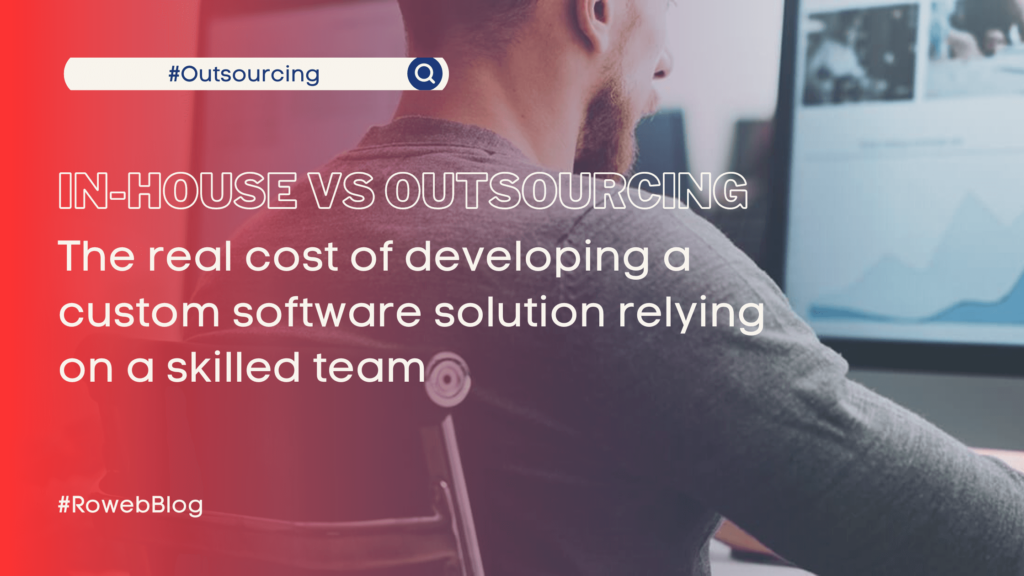
The great dilemma of finding the right experts for your software project: in-house vs outsourcing.
If you have to handle the software project of a business, you probably know that the development of custom solutions involves not only effort and financial investments, but above all an experienced team that can develop it right from scratch and scale it quickly depending on the dynamics of the business.
But who said that there is no challenge in building a senior development team for any project? Thus, if you don’t know exactly whether to outsource or just hire new employees, here are some things that may help you decide which is the best solution for you.
-
The Hidden Risks of Building an In-House Development Team
-
In-house vs outsourcing – key figures
-
The alternative to in-house hiring | Types of outsourcing models
-
Types of software solutions
-
Three examples of long-term partnerships from our portfolio | Customer success stories that showcase the benefits of outsourcing models
-
Conclusion
In-house developed software – The hidden risks of building an in-house software development team
Building an in-house software development team can be an advantageous strategy for many companies. However, it’s important to be aware of potential hidden risks that can arise during this process. Here are some of the key considerations:
Cost and resources: Establishing and maintaining an in-house software development team can be costly. You need to consider expenses such as hiring, salaries, benefits, office space, equipment, software licenses, and ongoing training. Additionally, it requires significant time and effort to recruit, train, and manage a team effectively.
Limited expertise: Developing and maintaining software applications often requires a diverse range of skills, including programming languages, frameworks, and domain-specific knowledge. Depending on your organization’s size and needs, it may be challenging to find and retain individuals with the necessary expertise in all areas, potentially leading to suboptimal or incomplete solutions.
Scalability and flexibility: In-house teams are typically built to handle the current workload and projects. However, if the demand for software development fluctuates, scaling the team accordingly can be challenging. You may face periods of underutilization or overload, which can impact productivity, efficiency, and cost-effectiveness.
Slow time-to-market: Establishing an in-house team takes time and effort to recruit and onboard employees, set up processes, and establish workflows. This can lead to delays in delivering software solutions compared to leveraging external vendors or partnering with specialized development firms. Time-to-market is a crucial factor in today’s competitive landscape.
Limited innovation and fresh perspectives: An in-house team may become entrenched in your company’s culture, processes, and perspectives, which can limit exposure to new ideas and innovative approaches. External development teams or vendors often bring a fresh perspective and broader industry experience, fostering innovation and creative problem-solving.
Technology obsolescence: The software development landscape evolves rapidly, with new frameworks, tools, and methodologies emerging regularly. Keeping an in-house team up-to-date with the latest advancements and trends can be challenging, especially if they lack exposure to a broader ecosystem of developers and industry practices.
Talent retention and attrition: Software developers are in high demand, and retaining skilled professionals can be a significant challenge. Experienced developers may receive enticing offers from competitors or decide to pursue other opportunities, leading to knowledge gaps and potential disruptions in ongoing projects.
In-house vs outsourcing – pros and cons
You can find yourself in one of the following situations:
1
You need to grow your in-house software development team, but you are not sure where to find the right experts and how much is going to cost you,
2
Or you think about outsourcing the whole process or just a part of your project, but you are afraid of losing control.
Check the in-house vs outsourcing pros and cons and you will get the best of both worlds.
In-house vs outsourcing: talent acquisition:
Both approaches have their advantages and considerations when it comes to talent acquisition. In-house teams provide direct control, cultural fit, and long-term retention, while outsourcing offers access to specialized expertise, scalability, and reduced recruitment efforts. But the choice depends on factors such as project complexity, budget, required skill sets, and strategic goals. Thus, before deciding which one fits your interests best, try to think of a long-term business strategy.
In-house vs outsourcing: loyalty and retention
As you probably know, in-house teams foster loyalty as employees become integrated into the company culture, have a deeper sense of ownership, and opportunities for career growth within the organization. But retention is influenced by factors such as job satisfaction, work-life balance, and professional development opportunities.
On the other hand, you may think that outsourcing a project to external providers may not inherently cultivate loyalty, as their allegiance is primarily to their own company. But effective project management, clear communication, and mutual trust can contribute to long-term partnerships, ensuring retention of reliable outsourcing partners for future projects. For example, our company has projects in its portfolio that have been ongoing since 2006.
In-house vs outsourcing: flexibility
Outsourcing a project provides inherent flexibility compared to an in-house development team. When outsourcing, you have the ability to quickly scale resources up or down based on project requirements, without the constraints of hiring or releasing employees.
External software providers are equipped to handle varying workloads efficiently, ensuring timely project delivery and adaptability to changing needs.
In-house vs outsourcing: control & overdependence
There are many entrepreneurs who believe that they only have control when they hire in-house experts. But outsourcing a project offers a distinct advantage in striking a balance between control and overdependence.
By outsourcing, you can also retain a significant level of control by establishing clear project guidelines, milestones, and communication channels. This approach allows you to focus on core business activities while maintaining oversight, avoiding the risks of over dependence on internal resources and enhancing flexibility in adapting to changing project requirements.
In-house vs outsourcing: legal issues
By outsourcing, you can transfer certain legal responsibilities, such as compliance with labor laws, contract management, and intellectual property protection, to the external provider.
However, this can alleviate the burden of navigating complex legal frameworks and reduce the risk of non-compliance disputes. Additionally, reputable outsourcing software development teams often have established legal frameworks in place, including confidentiality agreements and service level agreements, ensuring a solid foundation for the protection of your company’s interests and assets.
The alternative to in-house hiring: outsourcing modelse
In today’s rapidly evolving business landscape, companies have increasingly turned to outsourcing models as a compelling alternative to traditional in-house hiring. As mentioned before, outsourcing enables companies to leverage external expertise, optimize resource allocation, and drive cost efficiencies.
But there are various outsourcing models to consider, including end-to-end capabilities, dedicated development team, staff augmentation and extended development team. In order to make the best choice for your company, check the info below.
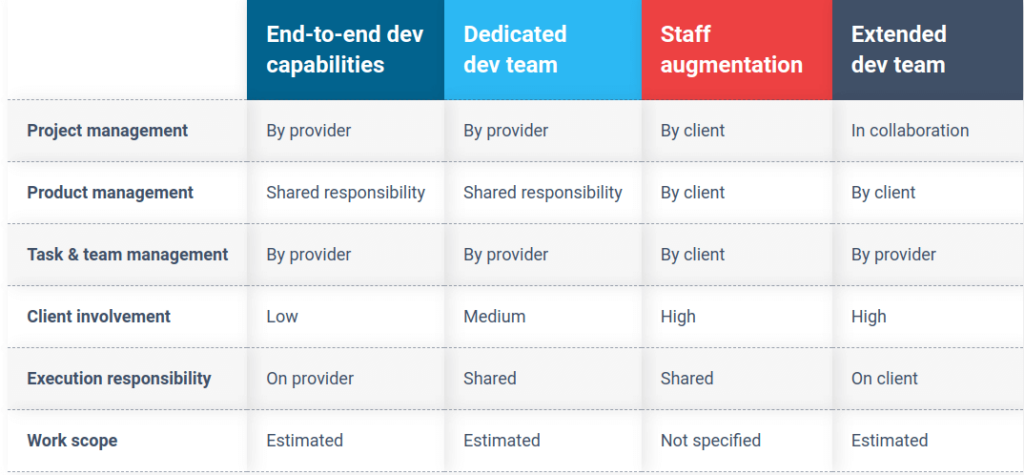
Types of software solutions
When exploring the option of outsourcing your project, you gain the opportunity to engage with development teams that specialize in delivering intricate software solutions with a strong focus on enhancing the user experience.
By opting for this approach, you can access a range of business applications that encompass the entire development process, incorporating key roles such as software developers, QA experts, and project managers.
This comprehensive approach ensures a seamless end-to-end solution, maximizing the effectiveness and efficiency of your project implementation.
Moreover, if you need a more complex system such as a CRM, outsourcing the process development allows businesses to tap into a global talent pool, ensuring access to skilled professionals and a diverse range of perspectives.
This collaborative approach can result in the creation of robust software systems that streamline sales and marketing processes, and in time, drive business growth.
The outsourcing process helps you be creative. You can turn ideas into functional e-shops, e-commerce apps or web portals according to your business necessities.
The development teams can assist you in selecting the most suitable e-commerce platform for your business. They can also provide your customers with useful features that will ensure their satisfaction and encourage them to return to your online store.
Moreover, do not forget about mobile apps.
Mobile apps have become an integral part of our daily lives, transforming the way we communicate, work, and access information.
These powerful software applications designed for smartphones and tablets provide a wide range of functionalities, from social networking and entertainment to productivity and e-commerce.
However, the right software development team can help you turn an idea into a mobile application with millions of downloads or even the potential to become indispensable.
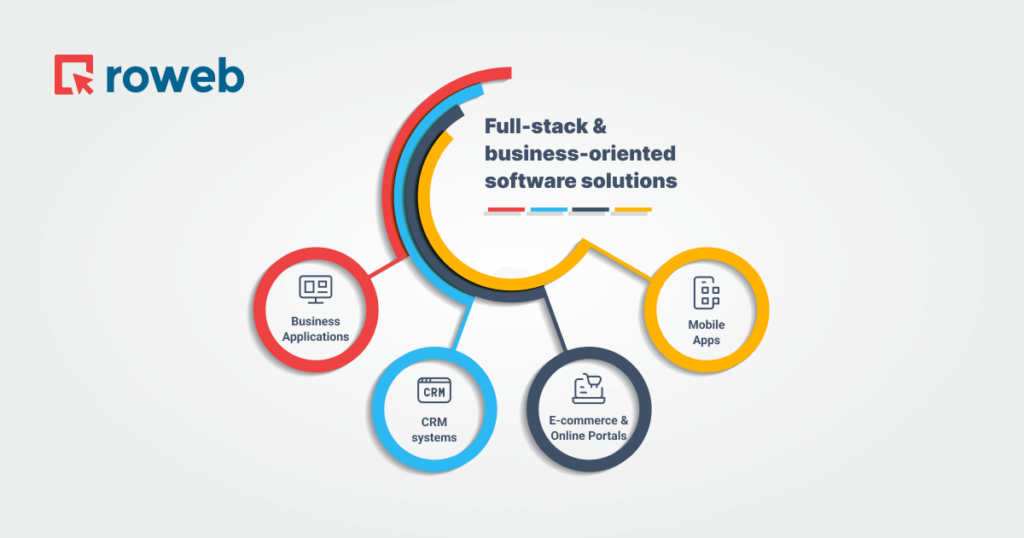
Three examples of long-term partnerships from our portfolio | Customer success stories that showcase the benefits of outsourcing models
Whise CRM

Whise CRM is an example of a success story where project outsourcing does not exclude the in-house team. Thus, our software developers have been working with the client’s technical team since 2006. The main purpose?
Our primary objective is to develop a cutting-edge and automated digital platform for buyers, owners, renters, investors, and real estate agents to enhance their overall experience.
The client’s perspective

Roweb proved to be a great partner to work with, providing us with a highly responsive team. During our collaboration, I found it very easy to communicate with them and they were very flexible in meeting our requirements. Because of the project’s complexity, new requirements came up quite often and they always managed to find and implement the adequate solution on time. I would have no hesitation in recommending them for complex business development projects.

Jean Waucquez
Owner, WHISE nv
Tourpaq
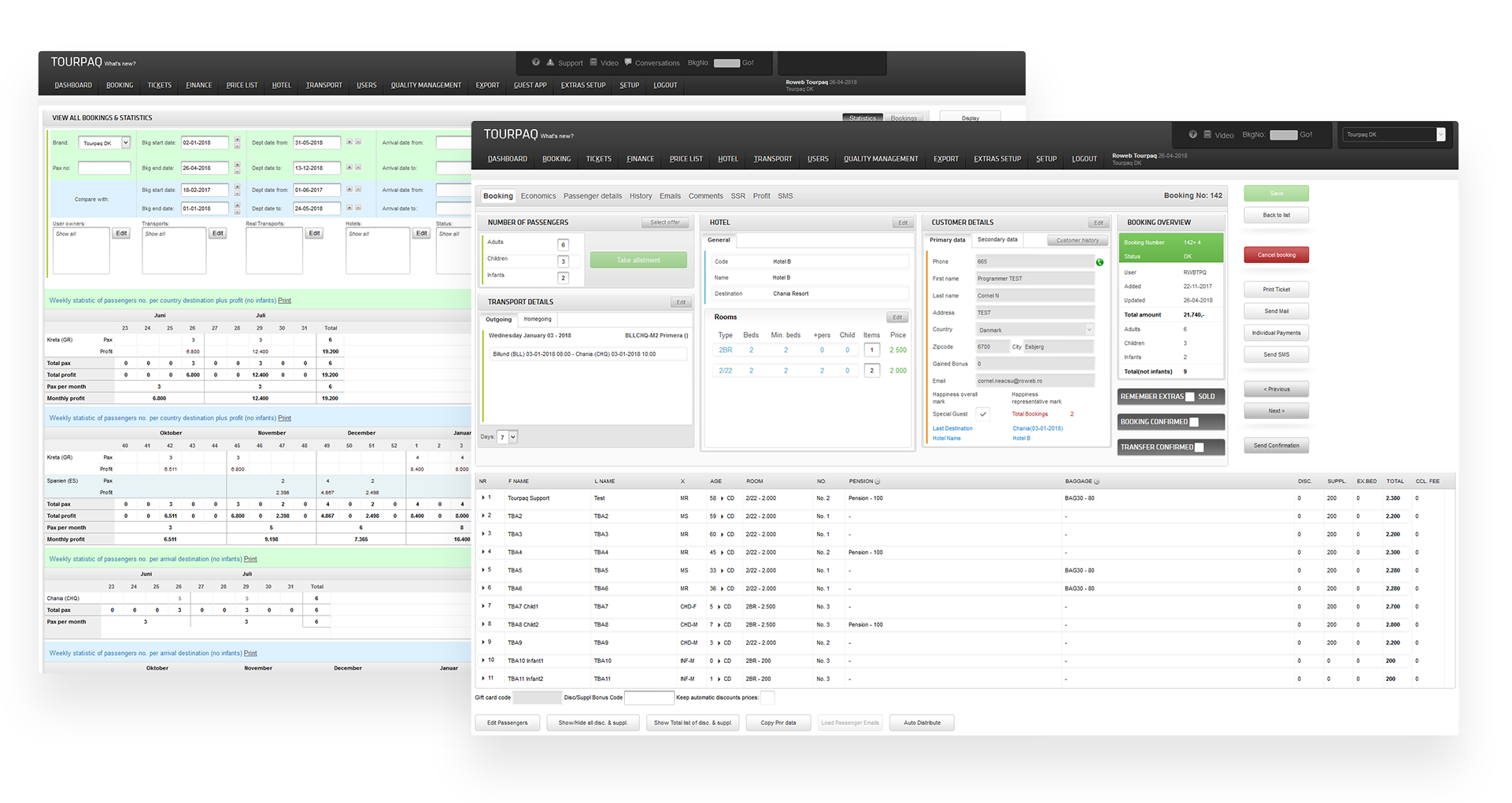
Tourpaq required a modern Tour Operator Management System that would allow users to efficiently handle all aspects of their activity through a centralized dashboard.
Tourpaq decided to collaborate with us for this project after several meetings. Our ability to comprehend their unique problem and provide effective solutions, along with the technical competence of our software experts, were the deciding factors.
The client’s perspective:

Together with Roweb we’ve built TourPaq up, from a booking system for small tour operators, into one of the leading solutions on the market, addressing the needs of large tourism businesses. We were impressed by the level of professionalism that Roweb showed throughout our collaboration. They have always managed to understand our needs and wishes and help us turn our ideas into reality.

Bjarke Hansen
CEO, Owner TourPaq Aps
nGAGE (VMS 365)
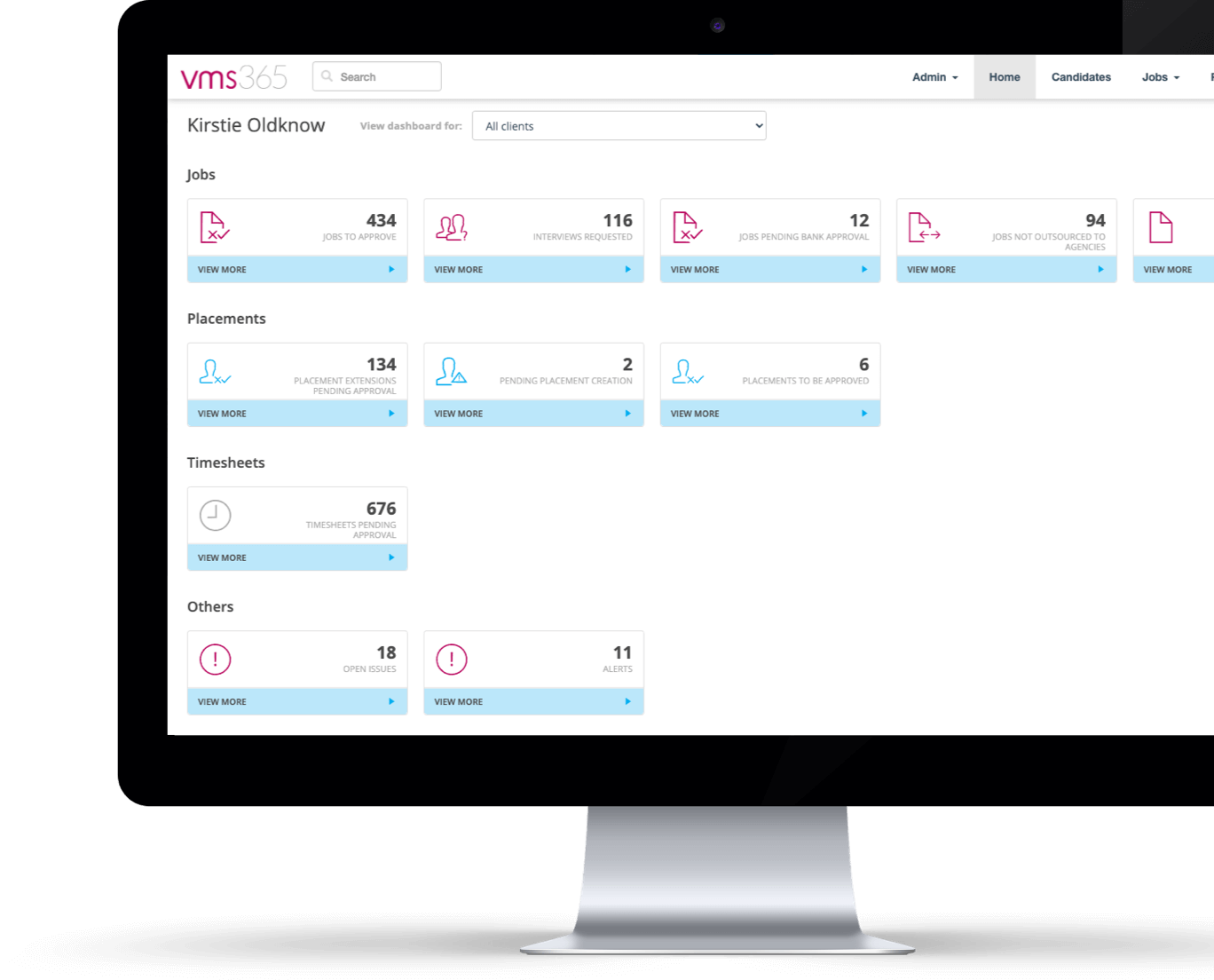
nGAGE is an award-winning company that invests in high-growth recruitment businesses.
They truly support and guide specialists, helping them become market leaders in their chosen sector.
The solution our team implemented improved HR processes in terms of speed and efficiency, supporting nGAGE in its rebranding process.
The client’s perspective:

nGAGE (formerly trading as Human Capital Investment Group) have worked with Roweb for more than eighteen months and during that time have been very impressed by the high level of skill, professionalism and service that they have delivered.

Tim Styles
Chief Information Officer at nGAGE (formerly trading as Human Capital Investment Group)
Conclusion
The decision between in-house and outsourcing development relies on carefully evaluating the real cost. While building an in-house team offers control and deep knowledge of the company, it can entail significant expenses, challenges in scaling, and potential skill gaps.
On the other hand, outsourcing provides access to specialized expertise, cost-efficiency, and scalability. But it requires proper vendor management to maintain control and avoid overdependence.
Understanding the project’s specific needs, long-term goals, and available resources is crucial in determining the most viable approach that balances cost, expertise, and flexibility for developing a successful custom software solution.
Interested in finding more about in-house vs outsourcing?
Check out more insights on ⬇




